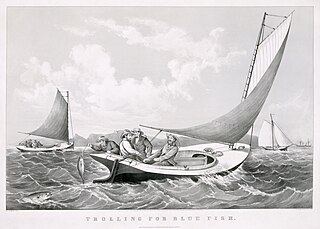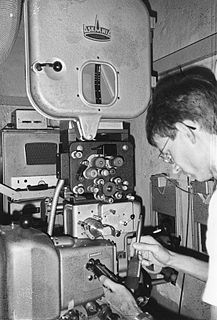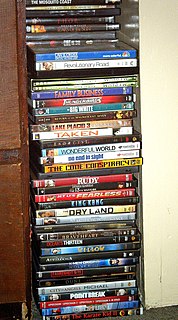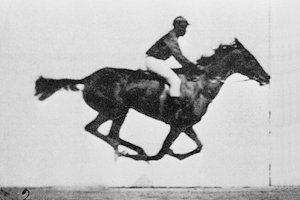
Although the start of the history of film as an artistic medium is not clearly defined, the commercial, public screening of ten of Lumière brothers' short films in Paris on 28 December 1895 can be regarded as the breakthrough of projected cinematographic motion pictures. There had been earlier cinematographic results and screenings by others, but they lacked either the quality, financial backing, stamina or the luck to find the momentum that propelled the cinématographe Lumière into a worldwide success.

Trolling is a method of fishing where one or more fishing lines, baited with lures or bait fish, are drawn through the water. This may be behind a moving boat, or by slowly winding the line in when fishing from a static position, or even sweeping the line from side-to-side, e.g. when fishing from a jetty. Trolling is used to catch pelagic fish such as salmon, mackerel and kingfish.

Vaudeville is a theatrical genre of variety entertainment born in France at the end of the 19th century. A vaudeville was originally a comedy without psychological or moral intentions, based on a comical situation: a dramatic composition or light poetry, interspersed with songs or ballets. It became popular in the United States and Canada from the early 1880s until the early 1930s, but the idea of vaudeville's theatre changed radically from its French antecedent.

A movie theater, cinema, or cinema hall, also known as a picture house, the pictures, picture theatre or the movies, is a building that contains auditoria for viewing films for entertainment. Most, but not all, theaters are commercial operations catering to the general public, who attend by purchasing a ticket. Some movie theaters, however, are operated by non-profit organizations or societies that charge members a membership fee to view films.
Set, The Set, or SET may refer to:
A short film is any motion picture not long enough in running time to be considered a feature film. The Academy of Motion Picture Arts and Sciences defines a short film as "an original motion picture that has a running time of 40 minutes or less, including all credits". In the United States, short films were generally termed short subjects from the 1920s into the 1970s when confined to two 35mm reels or less, and featurettes for a film of three or four reels. "Short" was an abbreviation for either term.

A fishing lure is a type of artificial fishing bait which is designed to attract a fish's attention. The lure uses movement, vibration, flash and color to bait fish. Many lures are equipped with one or more hooks that are used to catch fish when they strike the lure. Some lures are placed to attract fish so a spear can be impaled into the fish or so the fish can be captured by hand. Most lures are attached to the end of a fishing line and have various styles of hooks attached to the body and are designed to elicit a strike resulting in a hookset. Many lures are commercially made but some are hand made such as fishing flies. Hand tying fly lures to match the hatch is considered a challenge by many amateur entomologists.

The term World cinema is not the sum-total of all films made around the world. Rather, it is analogous to the use of the term "World literature". Johann Wolfgang von Goethe used the concept Weltliteratur in the early 19th century, to describe the international circulation and reception of literary works across Europe. His definition also included works of non-European authorship. Similarly, an interest in "world cinema" suggests an awareness of cinematic production, apart from the Hollywood Studio System which dominates international viewership.

A reel is an object around which lengths of another material are wound for storage. Generally a reel has a cylindrical core and walls on the sides to retain the material wound around the core. In some cases the core is hollow, although other items may be mounted on it, and grips may exist for mechanically turning the reel.

A projectionist is a person who operates a movie projector. In the strict sense of the term this means any film projector and therefore could include someone who operates the projector in a show. In common usage the term is generally understood to describe a paid employee of a movie theater. Projectionists are also known as "operators".
Sudanese literature refers to both oral as well as written works of fiction and nonfiction that were created during the cultural history of today's Republic of the Sudan. This includes the territory of what was once Anglo-Egyptian Sudan, as well as this area's long and diverse history.

Village Cinemas is an Australian-based film exhibition brand that mainly shows blockbuster, mainstream, children and family films and some arthouse, foreign language and documentary films. Since 2003, its Australian sites became a joint venture between Village Roadshow and Amalgamated Holdings Limited (AHL), forming Australian Theatres. Previous to this, Village Cinemas was the founding entity of parent company, Village Roadshow from 1954 when the first drive-in theatre was established, and from 1988 Warner Bros. owned a third share in the chain. The Village Cinemas brand also operates in various forms within some international markets, either as a joint venture with Village Roadshow, or under licence, where they also operate within Event Hospitality and Entertainment's Event Cinemas/Greater Union/Birch Carroll & Coyle, and many international cinema chains. Village Cinemas has output deals with all major film distributors and selectively screens some independently sourced films depending on material.

Fishing tackle is the equipment used by anglers when fishing. Almost any equipment or gear used for fishing can be called fishing tackle. Some examples are hooks, lines, sinkers, floats, rods, reels, baits, lures, spears, nets, gaffs, traps, waders and tackle boxes.
Video poetry is poetry in video form. It is also known as videopoetry, video-visual poetry, poetronica, poetry video, media poetry, or Cin(E)-Poetry depending on the length and content of the video work and the techniques employed in its creation.
The following outline is provided as an overview of and topical guide to fishing:

Home video is prerecorded video media sold or rented for home viewing. The term originates from the VHS/Betamax era, when the predominant medium was videotape, but has carried over to optical disc formats such as DVD and Blu-ray. In a different usage, "home video" refers to amateur video recordings, also known as home movies.

Film, also called movie, motion picture or moving picture, is a visual art used to simulate experiences that communicate ideas, stories, perceptions, feelings, beauty, or atmosphere through the use of moving images. These images are generally accompanied by sound, and more rarely, other sensory stimulations. The word "cinema", short for cinematography, is often used to refer to filmmaking and the film industry, and to the art form that is the result of it.

Idil Ibrahim is a Somali–American independent film director, producer, actress, writer.

Reel is a collection of poetry by George Szirtes, a Hungarian-born British poet and translator, which won the T. S. Eliot Prize for poetry in 2004. The collection has two parts, in a variety of forms, including sonnet and terza rima. It was praised by critics, who remarked on its emotional power and its attempts to recollect places and people in poems that use ekphrasis to incorporate and emulate elements of cinematography and photography.













